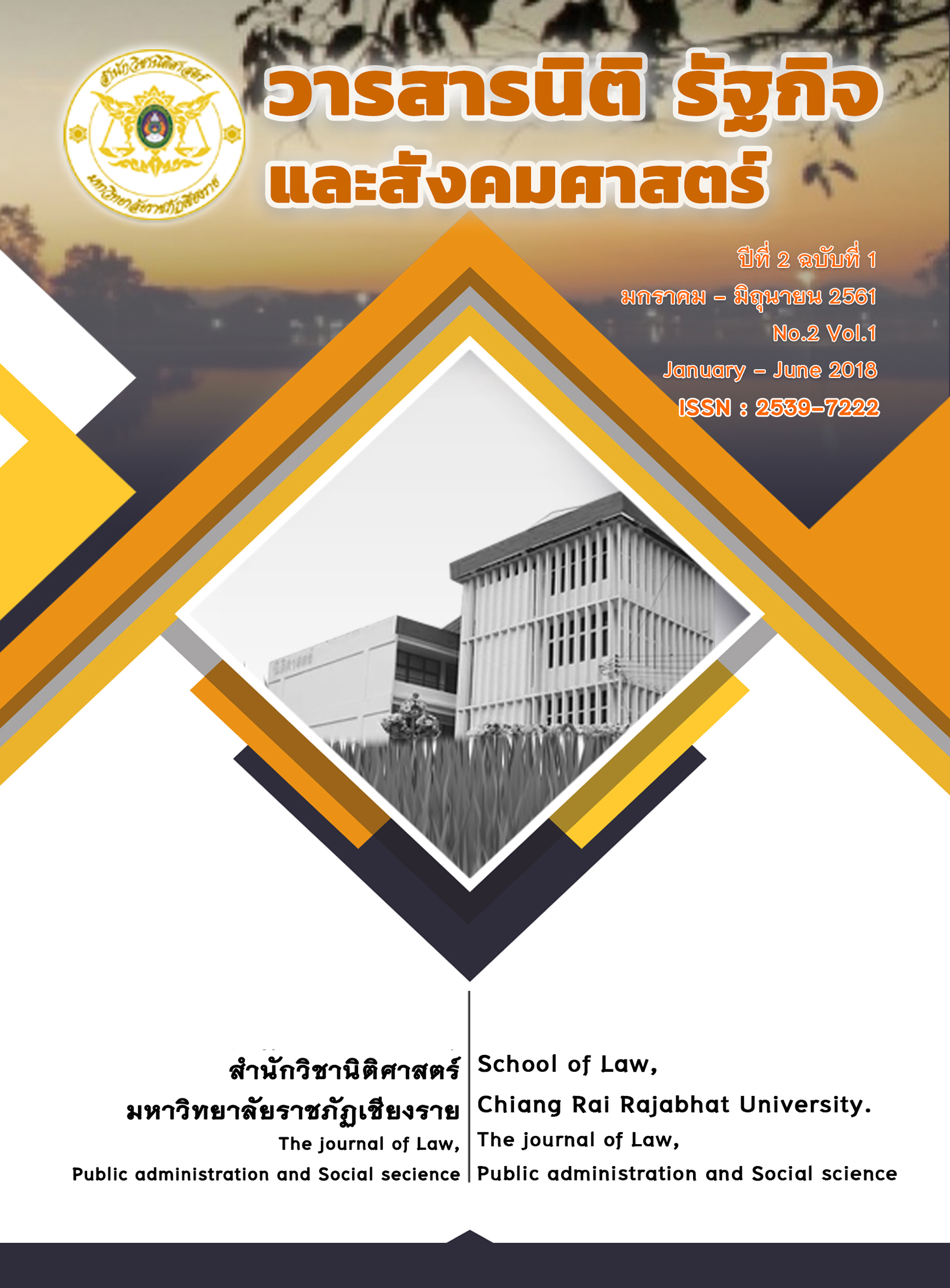วิพากษ์แนวความคิดปรัชญาเต๋า กับการใช้กฎหมายอย่างสันติวิธี
Main Article Content
บทคัดย่อ
ปรัชญาเต๋าถือว่าเป็นแนวความคิดที่มุ่งสอนให้มนุษย์อยู่ร่วมกันอย่างสงบและสันติภายใต้สภาวะธรรมชาติ ซึ่งถือว่าเป็นสภาวะที่ดีที่สุดที่จะนำพาสังคมให้อยู่รอดปลอดภัย ศาสดา เล่าจื้อ(Lao Tzu) ได้บัญญัติคัมภีร์เต๋าเต็กเก็ง (Tao Te Ching) โดยมีสาระระบุโดยสรุปเกี่ยวกับมนุษย์ การปกครอง กฎหมาย สังคม การอยู่ร่วมกันอย่างสันติวิธี โดยแนวปรัชญานี้ได้เน้นย้ำให้มนุษย์ออกห่างจากข้อยุ่งยาก และกฎเกณฑ์ทั้งปวง อาทิการปกครอง และกฎหมาย ซึ่งมนุษย์เชื่อว่าเป็นเครื่องมือแก้ไขปัญหาความขัดแย้ง และยังเชื่อต่อๆกันมาว่าจะนำสันติมาสู่มนุษย์ แต่ในคำสอนของปรัชญาเต๋ากลับมองว่ากฎหมาย หรือระบบการปกครองทั้งปวงเป็นเพียงโลกสมมุติ และจะคอยพันธนาการมนุษยชาติมิให้เข้าสู่วิถีแห่งความเป็นธรรมชาติ ดังนั้นการใช้กฎหมาย และการปกครองตามแนวปรัชญาเต๋าจึงอิงอยู่กับหลัก “ไม่กระทำ” ในทุกสิ่ง เพื่อให้ทุกสิ่งดำเนินไปตามวิถีทางแห่งตนเอง ในบทความนี้จึงวิพากษ์ให้เห็นถึงแนวทางแห่งความยุติธรรมอีกเส้นทางหนึ่งซึ่งมุ่งเน้นการให้คุณค่ากับธรรมชาติของมนุษย์ มากกว่าให้ความสำคัญกับกฎหมาย การปกครอง ซึ่งเป็นความยุติธรรมแบบปัจเจก หาใช่ความยุติธรรมอันเป็นสากลจักรวาลไม่ ในบางกรณีอาจนำมาปรับใช้กับกระบวนการบัญญัติกฎหมาย การใช้ และตีความกฎหมายซึ่งผู้บัญญัติควรเปิดช่องให้เกิดการเจรจาระหว่างคู่กรณีในฐานะมนุษย์ มากกว่าใช้กฎหมายเข้าบังคับบัญชาในทุกรณี
Article Details
เอกสารอ้างอิง
จรัญ โฆษณานันท์ . นิติปรัชญาแนววิพากษ์ . กรุงเทพฯ : สำนักพิมพ์นิติธรรม, พิมพ์ครั้งที่2,2555
ไชยันต์ ไชยพร . นิธิ เอียวศรีวงศ์ ใน/กับวิกฤตการเมืองไทย . กรุงเทพฯ : สำนักพิมพ์คบไฟ, พิมพ์ครั้งที่3.2557
พจนา จันทรสันติ . วิถีแห่งเต๋าหรือคัมภีร์เต๋าเต็กเก็งของปราชญ์เหลาจื้อ . กรุงเทพฯ : สำนักพิมพ์เคล็ดไทย, พิมพ์ครั้งที่2.2520
สมยศ เชื้อไทย . นิติปรัชญา(จิตติ ติงศภัทิย์บทบาทของนักกฎหมายกับเทศกาลบ้านเมือง) . กรุงเทพฯ : สำนักพิมพ์วิญญูชน, พิมพ์ครั้งที่18.2558.
อภิรัตน์ เพ็ชรศิริ . ทฤษฎีอาญา . กรุงเทพฯ : สำนักพิมพ์วิญญูชน, พิมพ์ครั้งที่3.2556
อาร์ม ตั้งนิรันดร . ความรู้เบื้องต้นเกี่ยวกับระบบกฎหมายจีน . กรุงเทพฯ : สำนักพิมพ์วิญญูชน, พิมพ์ครั้งที่1.2557.


